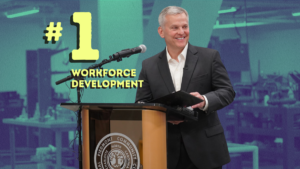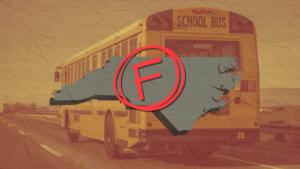Last week, North Carolina Governor Josh Stein called on legislative leaders to pass a comprehensive state budget after they failed to do so before the July 1st deadline. With lawmakers returning to Raleigh for session in the final stretch of September, Stein outlined priorities and needs that should be fulfilled– even in the absence of a state budget.
North Carolina currently sits as one of the only two states in the nation operating without a current state budget. The last state budget lawmakers created was set to run out in July, and since that deadline, lawmakers have only been successful in passing a reduced or “mini” budget that funds certain priorities. Though Stein signed the legislation in early August, he called it a “Band-Aid budget,” saying it falls short of what’s needed and fails to meet the needs of the people of North Carolina.
Though the state not having a budget won’t result in a government shutdown like the one looming at the federal level on September 30th, there are other consequences to not having a running state budget. According to the North Carolina Budget and Tax Center, the lack of a new budget leaves states running off of funding that was assigned in the previous budget, excluding any item marked as one-time or non-recurring funds. This leads to services staying the same while populations and inflation continue to rise.
With lawmakers due back in the General Assembly this week, Stein has asked them to prioritize passing a budget that meets the needs of the people of North Carolina for the 2025-27 biennium. In his letter to the General Assembly, Stein lists out priorities that “cannot wait” and “demand” attention upon the lawmakers reconvening: Medicaid rebase funding, public safety and teacher, state employee pay raises, and Helene relief. Though Stein sent this letter the week prior to lawmakers gaveling in for session, lawmakers still fell short of what the Governor requested and what North Carolina needs.
Despite the letter being addressed to the whole General Assembly, with a special address to the chamber majority and minority leaders, the responsibility for a lack of budget falls solely on the Republican Party, which holds a majority in both the Senate and the House. The Republican leaders of both chambers, House Speaker Destin Hall and Senate leader Phil Berger, are digging their heels in and not budging on budget negotiations, which include debate around funding for a newly planned Duke Health and UNC Health children’s hospital in Apex, as well as future tax cuts.
Berger said that, though they have not been able to come to an agreement on a full budget, there have been other matters that have been agreed to, which led to the Senate and House passing an appropriation package: House Bill 358, Continuing Budget Operations Part II. This bill includes $65 million for disaster relief, $35 million for public infrastructure improvement projects around the Lenovo Center in Raleigh, $51 million for economic development projects in Hertford County, and $65 million for the North Carolina Global TransPark Authority, which is involved in construction projects across the state.
This bill meets the Governor’s request for disaster relief by assigning $65 million for the cause, exceeding the $26.75 million that Stein requested from the lawmakers in his letter. However, it leaves out the other urgent priorities Stein outlined.
Another area of funding being held up by disagreements across chambers is Medicaid funding. Stein’s plea for Medicaid funding comes as the state attempts to prepare for devastating cuts to the program set to start October 1st, courtesy of President Donald Trump’s H.R. 1, the One Big Beautiful Bill Act.
The bill would cut $1 trillion from Medicaid over 10 years, endangering the healthcare of over half a million people in North Carolina alone and leaving the state to deal with a $319 million hole in Medicaid funding this year and an estimated $49.9 billion in ten years. Both chambers agree that there needs to be additional funding for the program, despite Berger publicly supporting H.R. 1 at the request of U.S. Senate Republican Candidate Michael Whatley.
Stein stated that the GOP leaders prioritizing the dispute over the children’s hospital ahead of the medical needs of the people is “inexcusable”. “With no agreement in sight to fully fund our Medicaid program, the General Assembly is closing off access to health care at a time when we need more,” Stein said in a press release. “Failure to act will lose us critical federal funding and take more than a billion dollars total out of our state’s health care system, needlessly hurting people’s health, health care providers, and our economy.”
Despite disagreements on a budget and Medicaid funding, one thing GOP leaders in both chambers agreed on was passing a crime omnibus bill, which they announced alongside the U.S. Senate Republican candidate Michael Whatley a week before the vote.
In his letter, Stein called for the lawmakers to invest in Public safety by requesting $195 million for public safety initiatives such as pay raises and recruitment, and retention bonuses for police officers. “After the horrific murder of Iryna Zarutska, we must help people feel safer in our state,” Stein states in a press release. “The General Assembly needs to make investments in public safety to put more cops on the beat, ensure that the magistrate system effectively holds criminals accountable, and keep people safe on public transportation and on our streets.”
However, after the release and vote of the bill, Democrats, including Stein, worry that some of the provisions in the bill are the wrong way forward. The bill includes a push to restart and expand the death penalty in the state, after Berger added an amendment calling for the Department of Adult Correction to select other methods of distributing the death penalty. Also included in the bill are stricter guidelines for pretrial release and the elimination of cashless bail.
Critics point out that the bill isn’t prioritizing the right steps, bypassing critical investments like mental health funding, capacity limitations, and correctional officer shortages in prisons.
The final priority outlined in Stein’s letter to lawmakers is increased state employee and teacher pay. This year, North Carolina ranked 43rd in the nation for teacher pay, nearly $14,000 below the national average. Stein asked for teachers to receive a 5.9% increase and for the restoration of master’s pay, in addition to giving other school employees a 3% increase. For state workers, Stein requested a 2% raise, totaling $226.5 million. No bills regarding teacher or state employee pay were voted on during the September session.
Stein continues to call for funding for Medicaid, public safety, and state employee raises, as well as a full state budget. “Let’s come together to do right by the people of North Carolina and prioritize the things that make North Carolina strong.”





